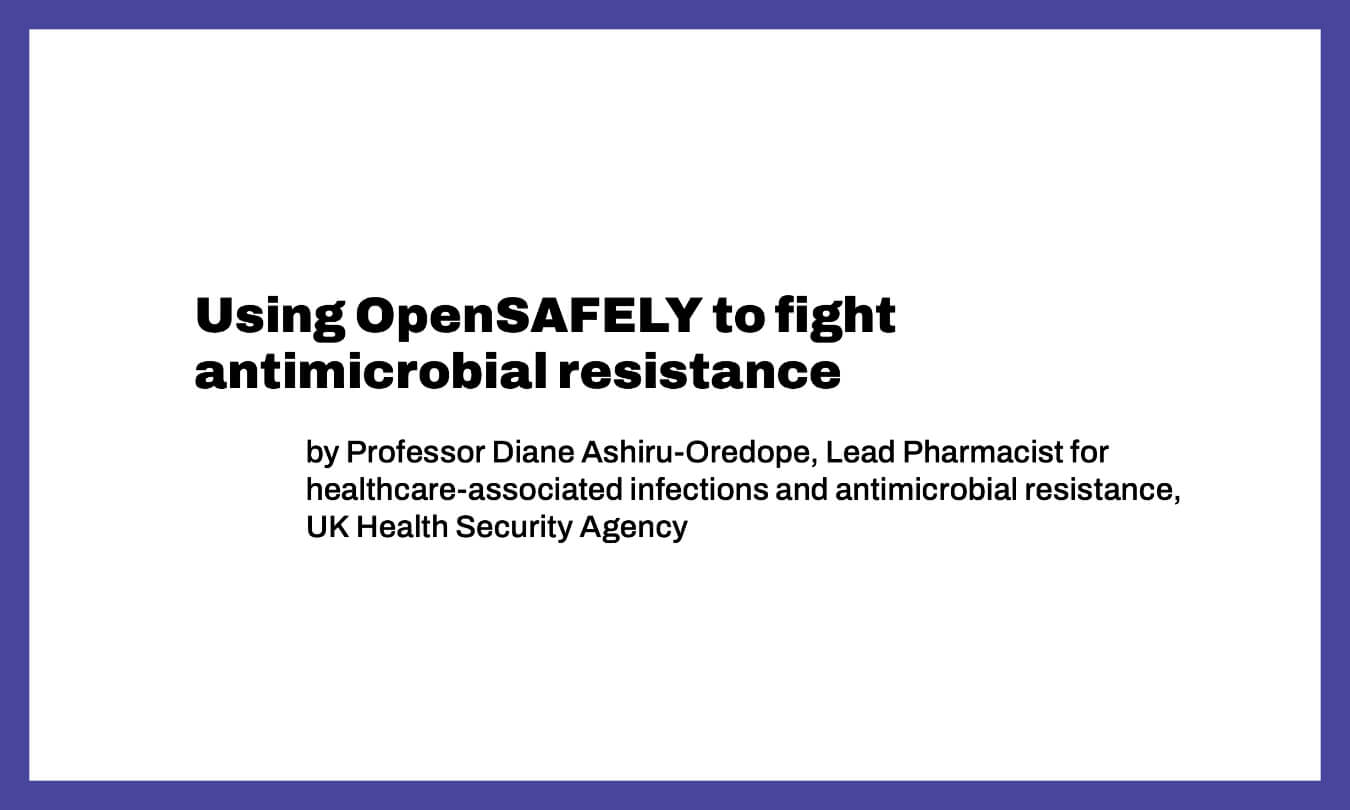Using OpenSAFELY to fight antimicrobial resistance
- Posted:
- Written by:
-
- Diane Ashiru-Oredope
- Categories:

This article is part of a series: The Past, Present and Future of OpenSAFELY
- The past, present and future of OpenSAFELY: Introduction
- How OpenSAFELY works
- Co-pilots give newcomers a helping hand
- Standard tools for data preparation, and federated analytics
- Output checking helps to keep private data safe
- The legal basis: ethics, controls and building trust
- Earning and maintaining trust: PPIE and more
- How OpenSAFELY began
- Consequences of COVID-19 and the role of vaccination
- “No other platform comes close”
- The 'unreal' speed of OpenSAFELY
- Using OpenSAFELY to fight antimicrobial resistance
- OpenSAFELY and antibiotics
- Using OpenSAFELY to carry out a randomised trial
- The OpenSAFELY Collaborative
- Some reflections about funding
- What's next for OpenSAFELY?
Written by Dr Diane Ashiru-Oredope, Lead Pharmacist for healthcare-associated infections and antimicrobial resistance, UK Health Security Agency
The more we use antibiotics, antifungals, antivirals and antiparasitics, the less effective they can become. It’s a phenomenon known as “antimicrobial resistance,” or AMR. One way to mitigate it is by avoiding inappropriate repeat antibiotic prescriptions in primary care.
Working collaboratively using OpenSAFELY, our team at the UK Health Security Agency (UKHSA) worked with the Bennett Institute on a study to evaluate repeat antibiotic prescribing from general practices during the pandemic. Overall, we found that antibiotic prescribing decreased during the pandemic, for many reasons including restrictions/lockdowns, changes in healthcare delivery, and healthcare-seeking behaviour. This decline was particularly pronounced for one-off prescriptions, compared with repeat prescriptions.
Because OpenSAFELY has lots of data from GPs, we were also able to investigate in granular detail the clinical and demographic characteristics of small groups of patients, and shine new light on health inequalities and AMR. We found that older patients and care home residents were more likely to receive antibiotics, especially repeat antibiotic prescriptions. With OpenSAFELY, we can match the prescription with the diagnosis and here, we found repeat prescribing was highest for people with chronic obstructive pulmonary disease (COPD) and urinary tract infections.
OpenSAFELY’s built-in reusability was an important part of this project. NHS England has a published approach to help reduce healthcare inequalities at national and systemic levels, known as Core20PLUS5. We were able to reuse code for this that was already available in OpenSAFELY, which helped us target specific health conditions, more deprived population groups, and ethnic minorities.
The result was that we were able to conduct one of the most granular antibiotics-prescribing studies ever undertaken. It showed a general trend of decreasing one-off and repeat prescriptions, but also huge variation in the changes across ethnic minorities:
- Compared to before the pandemic, there was a 40% decrease in one-off antibiotic prescriptions among patients of Chinese ethnicity
- On the other hand, for people with mixed ethnic backgrounds, such as White and Black African, White and Black Caribbean, and other mixed backgrounds, we actually noticed an increase in repeat prescriptions during the pandemic
- There were also distinct differences in patterns of prescribing between Indian and Pakistani communities, two groups which are normally aggregated together in smaller studies, hiding these differences
The findings from this study played an important part in developing new AMR tools for general practice teams, such as a set of “How to” guides to help manage and review adults on long-term or repeated antibiotics for Acne Vulgaris and COPD exacerbations. The guides were published online at the Royal College of GPs TARGET eLearning hub.
As a result of this project, we have a better understanding of how OpenSAFELY can help us address health inequalities related to infection and AMR. Building on this work, we also collaborated with the University of Manchester to assess the association between non-COVID-related sepsis incidence, mortality, and health inequality factors.
OpenSAFELY has been a productive tool for us so far, and we’re planning more work to investigate the risk factors for resistant bloodstream infections, to support the development of more interventions to slow AMR.


